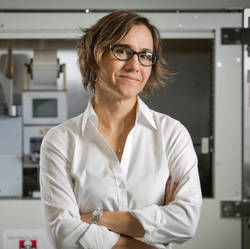Calls Now Open
2024 ADDF-Harrington + 2025 Harrington Scholar-Innovator Programs

Neuroscience
Novel Targeting of the ER Stress Response Pathway to Treat Movement Disorders of the Nervous System
2015 Harrington Scholar-Innovator
Somewhere in South Florida lives a retired high school biology teacher named Howard Weise who can pride himself on inspiring a student who is now a Harrington Discovery Institute Scholar-Innovator.
Neurologist Nicole Calakos, MD, PhD, clearly recalls the year Mr. Weise encouraged her to attend a University of Florida summer science program some 30 years ago. “When I was in high school, I was very people-oriented, and I liked science,” Dr. Calakos remembers. “I credit Mr. Weise with opening a door for me by sharing an opportunity.” The summer program experience ignited in her a fervent desire to do scientific medical research. That passion carried her through her medical education and propelled her into a career as a physician-scientist.
Now at the Duke Institute for Brain Sciences and the Duke Movement Disorder Clinic, Dr. Calakos says she is in an ideal situation for a physician-scientist. “You train a long time for this job,” she says. “Duke is among the top in neuroscience in the country, and here I have the ability to be well-integrated into the heart of the neuroscience and clinical neurology communities.”
That accessibility is important to her research on advancing a novel class of drugs that may help treat dystonia, a brain disorder that causes involuntary twisting movements and abnormal postures. “There's always a little serendipity in science,” Dr. Calakos says, explaining how she came to her discovery. “I was trying to figure out why a person in clinic had this disease and whether it was related to an unusual mutation in one of his genes.”
Her subsequent research led Dr. Calakos and her team, including collaborators at the National Center for Translational Sciences (NCATS), to develop an automated screening test that quickly evaluates the biological or biochemical activity of thousands of drug-like compounds. Through this screening, they were able to identify potential treatments that would fix the unusual protein distribution that occurs in the presence of the dystonia gene mutation.
With support from the Harrington Discovery Institute, she plans to complete two major objectives that will move her discovery closer to clinical trials. First, she will identify how these drugs normalize the mutant protein's distribution and, secondly, she hopes to solve the problem of how to formulate an improved drug that can readily penetrate the brain.
Although Dr. Calakos recognizes there are still many hurdles between this discovery and having a treatment for her patients, she says she also is highly optimistic. “When you work with patients, it keeps you focused on the need to make a difference.”
“There's always a little serendipity in science.”
Source: Article from 2014-15 Annual Publication.